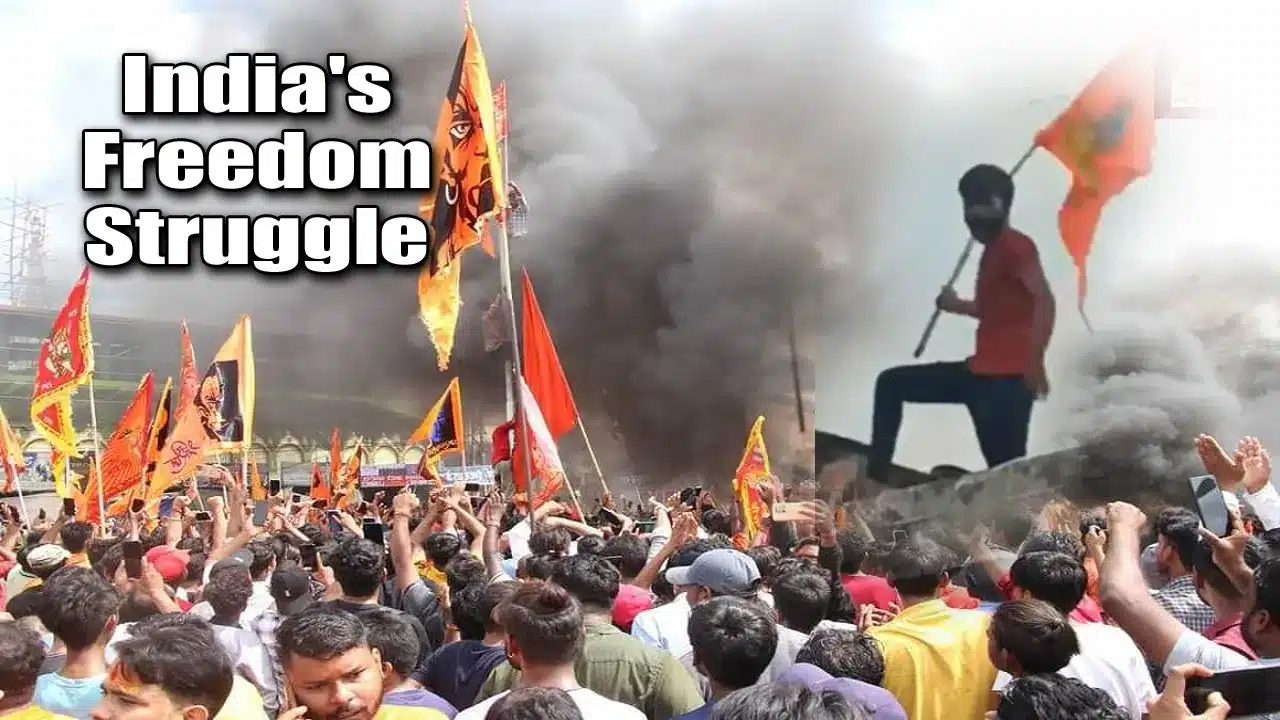LASTEST NEWS
Treason is not made on Zafarul slam, know the facts
Minority Commission Chairman Zafarul Islam has been booked for sedition and other sections
Zafarul Islam is the chairman of the Delhi State Minorities Commission. There is also a section 124A i.e. treason in the sections of the case registered against him. Can a person in this post be arrested, and what are the legal provisions in this regard, this is a different matter, but the main question is whether the case of treason is made or not, so now I am focusing on this post Am
This evening, senior officials of Delhi Police came to his residence for questioning and went away asking to cooperate in the investigation.
Treason is not made on the basis of the so-called facts written in the FIR. The Delhi Police has completely opposed the directions given by the Supreme Court to the police in the Common Cause case. In its order, the Supreme Court said that the section of treason should be imposed keeping the instructions given by the constitutional bench of the Supreme Court in the Kedarnath Singh case of 1962. Everyone has freedom of expression, but whether or not the crime of the country is made up of those spoken or written words, it should be looked at subtly.
In his Facebook post, Zafarul Islam Sahib has written, targeting people and organizations with a particular mindset without naming them. His statement is not against any religion or government. There is no sense of unease against the country and the constitution, nor is there any challenge to the sovereignty, independence, unity and integrity of the country. The dissatisfaction expressed by the mentality of a communal organization and the insecurity it is creating, has been expressed. Does international or Indian law not allow this? Is it not a fundamental right conferred in a democracy of an aggrieved citizen to express his suffering and is there any law restricting this freedom of expression. According to my legal knowledge, this country is not malicious.
Following the Supreme Court just stated in Common Cause Case Photo 2, 3, section 124A of treason in this case of Zafarul Islam Sahab should be removed.
Read what the constitutional bench of the Supreme Court said in the Kedarnath Singh case of 1962
See case of Kedar Nath Singh vs state of Bihar 1962 Supreme Court
In this case, we are directly concerned with the question how for the offence, as defined in s. 124A of the Indian Penal Code, is consistent with the fundamental right guaranteed by Art. 19 (1)
(a) of the Constitution, which is in these terms:
“19. (1) All citizens shall have the right.
(a) to freedom of speech and expression…”
This guaranteed right is subject to the right of the legislature to impose reasonable restrictions, the ambit of which is indicated by cl. (2), which, in its amended form, reads as follows:
“(2) Nothing in sub-clause (a) of clause (1) shall affect the operation of any existing law or prevent the State from making any law, in so far as such law imposes reasonable restrictions on the exercise of the right conferred by the said sub-clause in the interests of the security of the State, friendly relations with foreign States, public order, decency or morality, or in relation to contempt of court, defamation or incitement to an offence.”
It has not been questioned before us that the fundamental right guaranteed by Art. 19(1)(a) of the freedom of speech and expression is not an absolute right. It is common ground that the right is subject to such reasonable restrictions as would come within the purview of cl. (2), which comprises (a) security of the State, (b) friendly relations with foreign States, (c) public order,
(d) decency or morality, etc. With reference to the constitutionality of s. 124A or s. 505 of the Indian Penal Code, as to how far they are consistent with the requirements of cl. (2) of Art. 19 with particular reference to security of the State and public order, the section, it must be noted, penalises any spoken or written words or signs or visible representations, etc., which have the effect of bringing, or which attempt to bring into hatred or contempt or excites or attempts to excite disaffection towards the Government established by law” has to be distinguished from the person’s for the time being engaged in carrying on the administration. “Government established by law” is the visible symbol of the State.
The very existence of the State will be in jeopardy if the Government established by law is subverted. Hence the continued existence of the Government established by law is an essential condition of the stability of the State. That is why ‘sedition’, as the offence in s. 124A has been characterised, comes under Chapter VI relating to offences against the State.
Hence any acts within the meaning of s. 124A which have the effect of subverting the Government by bringing that Government into contempt or hatred, or creating disaffection against it, would be within the penal statute because the feeling of disloyalty to the Government established by law or enmity to it imports the idea of tendency to public disorder by the use of actual violence or incitement to violence. In other words, any written or spoken words, etc., which have implicit in them the idea of subverting Government by violent means, which are compendiously included in the term ‘revolution’, have been made penal by the section in question. But the section has taken care to indicate clearly that strong words used to express disapprobation of the measures of Government with a view to their improvement or alteration by lawful means would not come within the section.
Similarly, comments, however strongly worded, expressing disapprobation of actions of the Government, without exciting those feelings which generate the inclination to cause public disorder by acts of violence, would not be penal. In other words, disloyalty to Government established by law is not the same thing as commenting in strong terms upon the measures or acts of Government, or its agencies, so as to ameliorate the condition of the people or to secure the cancellation or alteration of those acts or measures by lawful means, that is to say, without exciting those feelings of enmity and disloyalty which imply excitement to public disorder or the use of violence.
It has not been contended before us that if a speech or a writing excites people to violence or have the tendency to create public disorder, it would not come within the definition of ‘sedition’. What has been contended is that a person who makes a very strong speech or uses very vigorous words in a writing directed to a very strong criticism of measures of Government or acts of public officials, might also come within the ambit of the penal section. But, in our opinion, such words written or spoken would be outside the scope of the section. In this connection, it is pertinent to observe that the security of the State, which depends upon the maintenance of law and order is the very basic consideration upon which legislation, with a view to punishing offences against the State, is undertaken. Such a legislation has, on the one hand, fully to protect and guarantee the freedom of speech and expression, which is the sine quo non of a democratic form of Government that our Constitution has established.
This Court, as the custodian and guarantor of the fundamental rights of the citizens, has the duty cast upon it of striking down any law which unduly restricts the freedom of speech and expression with which we are concerned in this case. But the freedom has to be guarded again becoming a licence for vilification and condemnation of the Government established by law, in words which incite violence or have the tendency to create public disorder. A citizen has a right to say or write whatever he likes about the Government, or its measures, by way of criticism or comment, so long as he does not incite people to violence against the Government established by law or with the intention of creating public disorder. The Court, has, therefore, the duty cast upon it of drawing a clear line of demarcation between the ambit of a citizen’s fundamental right guaranteed under Art. 19(1)(a) of the Constitution and the power of the legislature to impose reasonable restrictions on that guaranteed right in the interest of, inter alia, security of the State and public order.
We have, therefore, to determine how far the ss. 124A and 505 of the Indian Penal Code could be said to be within the justifiable limits of legislation. If it is held, in consonance with the views expressed by the Federal Court in the case of Niharendu Dutt majumdar v. The King Emperor(1) that the gist of the offence of ‘sedition’ is incitement to violence or the tendency or the intention to create public disorder by words spoken or written, which have the tendency or the effect of bringing the Government established by law into hatred or contempt or creating disaffection in the sense of disloyalty to the State in other words bringing the law into line with the law of sedition in England, as was the intention of the legislators when they introduced s. 124A into the Indian Penal Code in 1870 as aforesaid, the law will be within the permissible limits laid down in cl. (2) of Art. 19 of the Constitution, if on the other hand we give a literal meaning to the words of the section, divorced from all the antecedent background in which the law of sedition has grown, as laid down in the several decisions of the Judicial Committee of the Privy Council, it will be true to say that the section is not only within but also very much beyond the limits laid down in cl. (2) aforesaid.
In view of the conflicting decisions of the Federal Court and of the Privy Council, referred to above, we have to determine whether and how far the provisions of ss. 124A and 505 of the Indian Penal Code have to be struck down as unconstitutional. If we accept the interpretation of the Federal Court as to the gist of criminality in an alleged crime of sedition, namely, incitement to disorder or tendency or likelihood of public disorder or reasonable apprehension thereof, the section may lie within the ambit of permissible legislative restrictions on the fundamental right of freedom of speech and expression. There can be no doubt that apart from the provisions of (2) of Art. 19, ss. 124A and 505 are clearly violative of Art. 19(1)(a) of the Constitution. But then we have to see how far the saving clause, namely, cl.(2) of Art. 19 protects the sections aforesaid. Now, as already pointed out, in terms of the amended cl. (2), quoted above, the expression “in the interest of…public order” are words of great amplitude and are much more comprehensive than the expression “for the maintenance of”, as observed by this Court in the case of Virendra v. The State of Punjab (1). Any law which is enacted in the interest of public order may be saved from the vice of constitutional invalidity. If, on the other hand, we were to hold that even without any tendency to disorder or intention to create disturbance of law and order, by the use of words written or spoken which merely create disaffection or feelings of enmity against the Government, the offence of sedition is complete, then such an interpretation of the sections would make them unconstitutional in view of Art. 19(1)(a) read with cl. (2). It is well settled that if certain provisions of law construed in one way would make them consistent with the Constitution, and another interpretation would render them unconstitutional, the Court would lean in favour of the former construction. The provisions of the sections read as a whole, along with the explanations, make it reasonably clear that the sections aim at rendering penal only such activities as would be intended, or have a tendency, to create disorder or disturbance of public peace by resort to violence. As already pointed out, the explanations appended to the main body of the section make it clear that criticism of public measures or comment on Government action, however strongly worded, would be within reasonable limits and would be consistent with the fundamental right of freedom of speech and expression. It is only when the words, written or spoken, etc. which have the pernicious tendency or intention of creating public disorder or disturbance of law and order that the law steps in to prevent such activities in the interest of public order. So construed, the section, in our opinion, strikes the correct balance between individual fundamental rights and the interest of public order. It is also well settled that in interpreting an enactment the Court should have regard not merely to the literal meaning of the words used, but also take into consideration the antecedent history of the legislation, its purpose and the mischief it seeks to suppress (vide (1)). The Bengal Immunity Company Limited v. The State of Bihar (1) and (2) R.M.D. Chamarbaugwalla v. The Union of India (2). Viewed in that light, we have no hesitation in so construing the provisions of the sections impugned in these cases as to limit their application to acts involving intention or tendency to create disorder, or disturbance of law and order, or incitement to violence.
We may also consider the legal position, as it should emerge, assuming that the main s. 124A is capable of being construed in the literal sense in which the Judicial Committee of the Privy Council has construed it in the cases referred to above. On that assumption, it is not open to this Court to construe the section is such a way as to avoid the alleged unconstitutionality by limiting the application of the section in the way in which the Federal Court intended to apply it ? In our opinion, there are decisions of this Court which amply justify our taking that view of the legal position. This Court, in the case of R.M.D. Chamarbaugwalla v. The Union of India (1) has examined in detail the several decisions of this Court, as also of the Courts in America and Australia. After examining those decisions, this Court came to the conclusion that if the impugned provisions of a law come within the constitutional powers of the legislature by adopting one view of the words of the impugned section or Act, the Court will take that view of the matter and limit its application accordingly, in preference to the view which would make it unconstitutional on another view of the interpretation of the words in question. In that case, the Court had to choose between a definition of the expression ‘Prize Competitions” as limited to those competitions which were of a gambling character and those which were not. The Court chose the former interpretation which made the rest of the provisions of the Act, Prize Competitions Act (XLII of 1955), with particular reference to ss. 4 and 5 of the Act and Rules 11 and 12 framed thereunder, valid. The Court held that the penalty attached only to those competitions which involved the element of gambling and those competitions in which success depended to a substantial degree on skill were held to be out of the purview of the Act. The ratio decidendi in that case, in our opinion, applied to the case in hand in so far as we propose to limit its operation only to such activities as come within the ambit of the observations of the Federal Court, that is to say, activities involving incitement to violence or intention or tendency to create public disorder or cause disturbance of public peace.
We do not think it necessary to discuss or to refer in detail to the authorities cited and discussed in the reported case R.M.D. Chamarbaugwalla v. The Union of India (1) at pages 940 to 952. We may add that the provisions of the impugned sections, impose restrictions on the fundamental freedom of speech and expression, but those restrictions cannot but be said to be in the interest of public order and within the ambit of permissible legislative interference with that fundamental right.
It is only necessary to add a few observations with respect to the constitutionality of s. 505 of the Indian Penal Code. With reference to each of the three clauses of the section, it will be found that the gravamen of the offence is making, publishing or circulating any statement, rumour or report (a) with intent to cause or which is likely to cause any member of the Army, Navy or Air Force to mutiny or otherwise disregard or fail in his duty as such; or (b) to cause fear or alarm to the public or a section of the public which may induce the commission of an offence against the State or against public tranquillity; or (c) to incite or which is likely to incite one class or community of persons to commit an offence against any other class or community. It is manifest that each one of the constituent elements of the offence under s. 505 has reference to, and a direct effect on, the security of the State or public order. Hence, these provisions would not exceed the bounds of reasonable restrictions on the right of freedom of speech and expression. It is clear, therefore, that cl. (2) of Art. 19 clearly and the section from the vice of unconstitutionality.
-Author Mohd Asad Hayat is Senior Advocate
(The author is responsible for all claims and objections related to this article.)









most recommended allergy medication otc allergy medication comparison chart best allergy pill